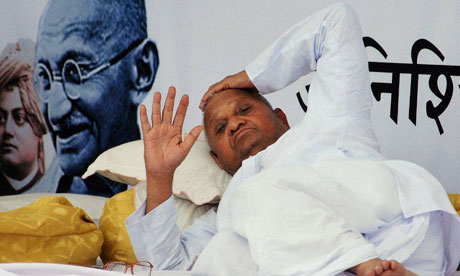Indian activist Anna Hazare refuses to end hunger strike
Anti-corruption campaigner says he will continue to 'fast until death' as campaign inspires millions to stage their own protests
- guardian.co.uk,
- Article history

Anna Hazare said he felt a little weak but refused to end his 'fast until death'. Photograph: AP
A 73-year-old Indian anti-corruption campaigner has refused to end his "fast until death" despite government concessions on his demands for a powerful new body to stamp out graft in the country.
Anna Hazare ended his third day of hunger strike on Thursday saying he had lost weight and "felt a little weak" but could continue without food for at least another week.
Hunger strikes – which invoke the memory of those undertaken by Mahatma Gandhi – are popular political tactics in India and are frequent features of public life. However, this most recent campaign against corruption has mobilised millions of Indians. Hazare's Facebook page has more than 80,000 friends and supporters mobbed the Jantar Mantar observatory, the site of his hunger strike, in central Delhi on Thursday.
Tens of thousands also joined the protests, ranging from hunger strikes to candlelit vigils in cities around the country including Mumbai, Lucknow and Jaipur. A number of Bollywood stars have also come out in support of Hazare, a former soldier and veteran social activist.
Corruption in India is endemic and ranges from the small fees that need to be paid to avoid fines for trumped up traffic offences to an alleged £24bn fraud in the telecoms sector, which saw a former government minister jailed last month.
"This is a corrupt government, full of corrupt ministers in a corrupt country. We have had enough," said Peta Singh, an 18-year-old student from Noida, a satellite town of Delhi, who had travelled to the centre of the capital with friends to demonstrate.
The telecoms scandal was just one of a series to hit the Congress-led coalition in the last year. Others included alleged kickbacks connected with the hugely expensive 2010 Delhi Commonwealth Games.
The protesters want speedy adoption of a law to create a powerful anti-corruption ombudsman which would be able to ensure rapid investigation and prosecution of offenders. Current authorities – described as either politicised or toothless by protesters – would be placed under the ombudsman's control.
The activists reject the current draft of the law as too weak. It suggests the ombudsman, known as the Lokpal, be a recommending authority without prosecuting powers.
The wealthy and powerful in India usually escape any charges against them or succeed in drawing out the legal process for many years, sometimes decades.
A bill to set up a powerful anti-graft mechanism has been repeatedly introduced into parliament but has never passed. Many lawmakers make huge fortunes illegally.
Keshal Gunjal, 28, had come to Delhi from the southern city of Pune to support Hazare. A science graduate who had given up his government post in protest against "the system", he said Hazare and his followers would achieve their aims.
"We will definitely reach our objectives. All of India is united against corruption – except the corrupt people of course," he said.
Another demonstrator, PN Jha, said he had personal experience of "scams" while working in the oil and gas sector.
"No one believes the politicians any more," he said.
In the global list of perceptions of corruption compiled by Transparency International, India is ranked the 87th least corrupt along with Albania, Jamaica and Liberia. China ranks 78th and Pakistan 143rd, local commentators have noted.
Brahma Chellaney, a respected Indian international affairs analyst and author, has called corruption an "existential threat" to India.
Negotiations between the campaigners and the government are set to continue on Friday.
No comments:
Post a Comment